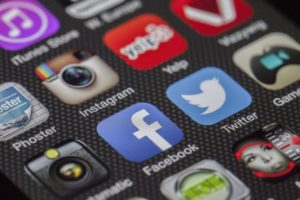
Can’t Find Love Online? It’s Not You; It’s The Algorithms
When I was in 8th grade, my school thought it would be a great idea for us students to fill out a questionnaire and run all of them through computer matchmaking software, and then give us a sheet of compatible people. This was in the era of floppy disks, but nonetheless, I had a strange amount of faith that a computer would succeed in finding me the right person, since my awkward teenage self wasn’t very good at doing it.
 When the results arrived, I was extremely disappointed. My top matches weren’t even close to the girls I liked in real life. Others complained as well, as their boyfriends and girlfriends weren’t on their top list. The only “couple” that did have a high match percentage was my brother and a girl who liked him (whom he ended up dating), but that’s because she got a hold of his answers and changed hers accordingly.
When the results arrived, I was extremely disappointed. My top matches weren’t even close to the girls I liked in real life. Others complained as well, as their boyfriends and girlfriends weren’t on their top list. The only “couple” that did have a high match percentage was my brother and a girl who liked him (whom he ended up dating), but that’s because she got a hold of his answers and changed hers accordingly.
It sounds absurd that anyone would base love on a software program’s suggestions, but that’s exactly what we are doing when we hand over control of our dating lives to dating apps
In the early days of dating apps, you pretty much saw everybody and could message everybody. Then women started realizing something. Online dating is a lot like being a single woman at a club full of drunk and horny men. There are a lot of guys competing for their attention. So, women would get inundated with messages from all kinds of guys…married guys, much younger guys, much older guys, creeper guys, ugly guys, guys from all over the world, scammer guys, and every other type of guy imaginable.
So, dating apps started to restrict men’s access to women accordingly. They not only gave women more choice in their filters, but they also made it so many guys wouldn’t even be seen unless they fell into a narrow band of what women claimed they were looking for in a guy.
Swipe apps were perfect for this, because a guy couldn’t just shoot a random message to a woman unless she matched with him first.
But then even swipe apps started getting crazy. Women were literally matching with every guy that came up because guys were pretty much liking every woman. Women were sick of sorting through so many perceived duds, they wanted to not even see most guys. So, swipe apps started developing algorithms so that most guys just became invisible.
 All of this seems like a good development, but the problem is that we are dealing with human love and attraction, not picking which computer to buy.
All of this seems like a good development, but the problem is that we are dealing with human love and attraction, not picking which computer to buy.
Love is far messier and more complicated.
For one, machine learning sucks at matching people at least if the criteria is real-world attraction and connection. I believe part of this is because humans in general suck at knowing what we really like from people.
Things like smell, presence, charm, kindness, and even a person’s immunity level all go into real world attraction and connection. These are more important than the things we logically say matter (or that dating apps tell us matter), like common interests, political views, and even a person’s exact age, height, or weight. Attraction is more of a gut feeling than a combination of logical check-boxes.
Dating apps can’t measure for these things.
An algorithm simply can’t “get” chemistry, at least not yet. It can’t find you that unexpected person who takes your breath away for reasons you aren’t sure of. And, this is assuming dating app algorithms are even designed to get you into a relationship. I mean, a billion dollar company like Match Group (which owns Tinder, Hinge, OK Cupid, and Match) certainly has our best interests in mind, right?
I often joke that a lot of people wouldn’t even see some of their biggest crushes on dating apps. Your boss you can’t stop thinking about at work? You didn’t know he was in his 30s instead of his 20s because he looks young for his age, did you? He’s out.
The guy you see on the subway every day who smells amazing? He lives 25 miles away and is actually 5’8″ and not 5’10” so he’s out of your range on both filters.
Even if you did have your filters set as openly as possible, dating algorithms tend to show you a narrow subset of people, and heavily restrict the guys you see, so you probably wouldn’t see either of them on a dating app anyway, unless you swiped for hours.
 An app was recently released that showed how limiting dating app algorithms can be. The more you swipe, the more the app limits the types of people you’ll see. By the end, you are only seeing a narrow band of people (or monsters in the case of the app mentioned above).
An app was recently released that showed how limiting dating app algorithms can be. The more you swipe, the more the app limits the types of people you’ll see. By the end, you are only seeing a narrow band of people (or monsters in the case of the app mentioned above).
So, you may not be seeing the very people you would connect with in real life, but are instead seeing a very narrowly defined group of people you think you’ll connect with. This may be why the success statistics related to relationships derived from online dating aren’t very encouraging.
Imagine if real life worked this way. The people you have come to fall for over time, or whom you fell for that initially weren’t your “type,” wouldn’t exist in your awareness.
If there should be a dating theme for 2019, it should be “break free from the algorithms.”
Guys need to break free because they simply aren’t being seen. They are invisible to most women, and have no way to project what matters online to be seen: their personalities, presence, etc.
If you don’t believe me, keep in mind that despite the rise of online dating’s popularity, the number of guys who are involuntarily single has skyrocketed, and includes 1 in 3 men under 30 who haven’t had sex in the last year. In fact I recently wrote an article suggesting men should simply go “offline” and meet women in person because that’s their only real hope these days to stand out.
Women need to break free because they aren’t leading to the quality relationships that most women want. Relationships that began online are 28% more likely to break down in the first year, and marriages from online dating are three times more likely to end in divorce (see this).
There is also the issue that algorithms enable men to be players. There is evidence that most women are liking the same subset of guys. For example on the Hinge app 1% of guys received 16% of all female likes. The top ten percent of men got over 50% of female likes! This means that a small subset of guys (the ones women are all liking) have a constant stream of women liking them.
This explains the flaking, ghosting, and rejections of exclusivity many women complain about, because many of the guys the algorithm is showing you are getting a constant cycle of women matching with them. These guys have no incentive to ever settle down, or if they do, it will be with the absolute, most perfect woman of the bunch.
So, for men and women both, breaking free from the algorithm means: talking to people you meet in real life, approaching people, taking out your headphones, showing openness, smiling, flirting, being present in the moment instead of being buried in your phone, stop playing “hard to get,” etc. Basically, it means going back to the way people made chemistry-filled connections in the past: in the real world, where the only limiting algorithm is you.




